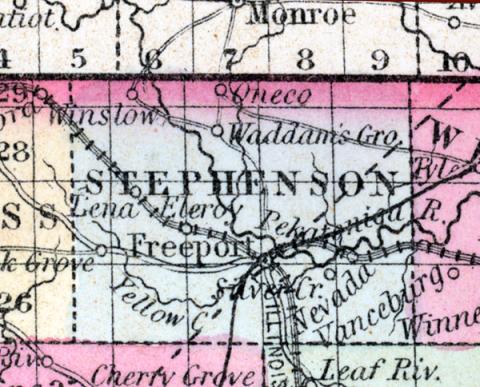STEPHENSON COUNTY, situated on the north boundary of Illinois, and traversed by Pekatonica river. Area, 500 square miles. Seat of justice, Freeport. Pop. in 1840, 2,800; in 1850, 11,666. (Fanning's, 1853)
STEPHENSON COUNTY Is situated in the northern tier of counties, next to the Wisconsin line, with Winnebago on the east, and Jo Daviess on the west. As a farming district, it has no superior in the state. The soil is deep and strong, the surface undulating enough to mate it picturesque and healthy, while water — good spring water— is abundant, and timber is near at hand. A part of the county is prairie — as rich prairie, too, as the sun ever shone upon — while the balance is mingled prairie and "openings," with spots along the streams and river heavily timbered. Everywhere, the quality of the soil is excellent, as the abundant crops raised by the enterprising farmers can testify. Some of the largest yields ever known in the world have given Stephenson county's soil a name and fame abroad that is well deserved. The amount of farm products annually exported from this county at Freeport city, and other railroad stations is enormous, and with such a ready cash market, at fair prices, close at their firesides, and with land so fertile and so cheap, is it any wonder that the farmers are growing wealthy with a rapidity that would astonish their down-cast friends? Not at all. The country they inhabit is a rich and beautiful one. Its soil is equal in almost any portion of it to that of the gardens of New England and New York, and its resources are as yet but half developed. In the language of the History of Stephenson county, "as the traveler comes west from Chicago, he will find but little in the appearance of the country on the line of the road that is inviting, until he approaches Elgin, on Fox river. When he approaches Marengo, and is conveyed through the center of Garden Prairie, he begins to see some of the loveliest portions of the western county; and as he passes by the flourishing town of Belvidere, in Boone county, and the city of Rockford, on Rock river, his admiration of "Prairie Land" will in no wise be diminished. The face of the country is a little more uneven, and the soil is generally allowed to be richer between Rock river and the Mississippi than in the counties lying in the direction of Lake Michigan. Throughout the county the land is sufficiently rolling to make the prospect diversified without being detrimental to agriculture.
"The soil seems well adapted for almost every kind of grain or fruit which usually grows in these northern latitudes."
No portion of the country, east or west, is more healthy than is this section of Northern Illinois. The facts show that in the city of Freeport itself the mortality during the year 1856, was but one per cent. — a rate as low as in any city in the Union—and the country around is remarkable for the healthfulness of the people. Consumption, that grim destroyer that makes such havoc among the people of many of the eastern and middle states, is almost unknown here, while cases of fever and that class of diseases are no more common than they are there. When the country was first settled there was more or less of fever and ague, just as there is now in Iowa, Minnesota, Kansas, and Nebraska; but the period of its existence here is almost passed — it is fading away, and is thought of as among the things that were and are not. Emigrants, therefore, who conclude to take up their abode upon the beautiful and fertile rolling prairies of Stephenson county, need have no fears of this unpleasant visitor. They will find here broad acres of as rich soil as the earth can show, acres of gently rolling prairie, well interspersed with beautiful groves of timber, and well watered with fine running streams, all of which can be bought at prices which will enable them at once to reap a rich interest, and ensure them largo profits upon their investments. They would find themselves surrounded, without delay, by a large share of the comforts they enjoyed in their eastern homes — comforts with which they would be compelled to dispense if they chose to cross the Father of of Waters, and try their fortune in newer lands. (Hawes' Illinois State Gazetteer..., 1859)

